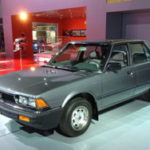Yes, I was there. Through the most unlikely cosmic hiccup, my name was drawn in the Boston lottery. I ran the 100th not because I possessed the talent, but because I had the audacity to put my name on a postcard. Destiny, it seems, has a sense of humor.
Destiny also has a taste for irony and melodrama. I found out that my name had been selected on October 10, two days after the “Fox Cities Marathon”. Two days after my wife and running partner had missed qualifying at Fox Cities, in part because of her concern for my injury.
Never was it more true than for the 100th Boston that the miracle was not in finishing, but in having the courage to start. That’s because in December that same rebellious knee forced me out of the “Rocket City Marathon” at mile 15. And in January, it was that same knee that the good Dr. Jordan injected with a burning shot of cortisone, not so that I could run or waddle, but so that I could simply walk.
The emotional dichotomy was nearly paralyzing. Knowing that this would very likely be my only Boston meant walking a tightrope of unbridled excitement and abject terror. The elation of going was always offset by the ever-present knee brace, the desire to run tempered by the need to heal, and the joy of the dream clouded by the painful reality.
But go I did. Still uncertain of my right to be there, I waded tentatively into the torrent of festivities and rituals that was Boston 100. I moved anonymously through the crowds at the expo, fearing that the real runners would recognize this impostor – this Penguin on a pilgrimage – in their midst.
The effect of Boston 100 was cumulative. Each day brought new enlightenment, new awareness. Sitting in a room with former champions, with the men and women who have come to define the “Boston Marathon”, I discovered that I share something with these runners that transcends our finishing times.
The heroes of the past are, it turns out, quite ordinary people. It’s just that they have accomplished extraordinary deeds. They have run their races, set new standards and opened previously unopened doors. Yet, above it all, they are first and foremost runners. Their passion for the sport, for the joy of running, is indistinguishable from the passion of those who cross the finish line hours behind them.
Standing in the “B Open” corral on a sun-drenched Monday morning, I found myself surrounded by people who were just as possessed by the will to test their physical and emotional limits as even the most talented of the elite runners. The men and women, young and old, surrounding me each brought to bear all the courage they could muster against this daunting challenge called Boston. They were each champions in their own way.
And somehow the marvelous crowds knew that. Instinctively or through experience, the spectators – at Wellesley College, on Heartbreak Hill, along Boylston – knew that we needed them at least as much as those who had breezed by hours before. They knew what I was just beginning to learn. They knew that in the final analysis, Boston 100 came down to each person conquering the fears and insecurities that might sabotage their goal – whether that goal was to be the outright winner or, a much more personal victory, simply to complete the course.
My admiration for the elite runners is deeper now. They are sublime athletes. My admiration for all the other runners is deeper as well. I understand now the passion to qualify and the will to train. But Boston 100 was, in the end, what all races are. Ordinary people accomplishing extraordinary deeds.
History was made on April 15, 1996. Five hours, 32 minutes and 26 seconds after I crossed the starting line, I finished. But my name will not be among those remembered. A slow, middle-aged man will not even be a footnote in the story of the 100th “Boston Marathon”. And yet, in my own private history book, I will devote an entire chapter to this race. If only for myself, I will celebrate all the miles to Boston, not just the final 26.2.
Waddle on, friends.








